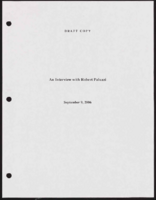Search the Special Collections and Archives Portal
Search Results

Transcript of interview with Julie Menard by Joyce Marshall, March 17, 1996
Date
Archival Collection
Description
Julie Menard began her career as a showgirl in 1964, performing in the Folies Bergere at the Tropicana Hotel. Although she appeared in the show for only sixteen months, she offers an insider’s view of the early Las Vegas entertainment scene. She describes a period when showgirls were treated as local royalty and “the boys” wielded considerable influence. Menard’s narrative sheds light on the glamour and complexities of the showgirl. Her descriptions of physical characteristics of the job, the day to day work schedules, the expectations of physical beauty, as well as the stigma of her occupation outside of Las Vegas offer a fuller view of the job. Menard left Las Vegas in 1966 to pursue a film career in Europe but like many Las Vegas entertainers, she returned to make the desert city her home. Although her brief performing career failed to prepare her for future employment, she relishes her brief experience as a showgirl. Her narrative evokes the glamour, excitement and mystery of Las
Text

Transcript of interview with Patricia Mulroy by Claytee White, November 18, 2013
Date
Archival Collection
Description
Patricia Mulroy served Las Vegas as the general manager of the Las Vegas Valley Water District from 1989 to 2014. She served the state of Nevada as the general manager of the Southern Nevada Water Authority from 1993 to 2014. Patricia helped to build the Authority, and saw the state through the devastating drought of the Colorado River. Patricia was born in Frankfurt, Germany on February 24, 1953. As a young girl, she lived in several different countries, but always felt that the United States was her home. Her experiences abroad led her to develop a fascination with government work and state service. She arrived in Nevada in 1974 to attend UNLV. In 1989, Patricia became the general manager of the Las Vegas Valley Water District. She entered the field at a tumultuous time, facing the drought of the Colorado River and tension within the districts. She pioneered the Water Authority, which revolutionized southern Nevada’s water rights system and allowed the districts to deal with the is
Text

Transcript of interview with Robert Paluzzi by Claytee White, September 5, 2006
Date
Archival Collection
Description
Claytee White interviews Robert Paluzzi on September 5, 2006.
Text

Transcript of interview with Ian and Irmalee Anne Ross, by Claytee White, March 28, April 5-6, 2012
Date
Archival Collection
Description
R. Ian Ross, better known as Ross, and wife Irmalee have dedicated their lives to serving, and improving, their community. Both Ross and Irmalee’s families moved to Las Vegas, from Los Angeles and Reno respectively, drawn by the opportunities presenting themselves in the growing city. While in college, Ross would spend his summers as busboy at the Sands hotel, where his mother worked as beauty consultant and salesperson. Ross attended law school, and soon after finishing, started a law firm with Jerry Snyder and Oscar Goodman. After a couple of years, Ross took a position with the City Attorney’s Office while also starting his own private firm. He later served as an assemblyman in 1977-78. In addition to his work as an attorney, Ross has engaged in various real estate ventures over the years, largely in North Las Vegas. He served as the president of the North Las Vegas Chamber of Commerce, and dedicated himself to developing this part of town. During this time, Irmalee was an active member in various social organizations, including Junior League, of which she still is a member. Having lived in Las Vegas for over 50 years, from ‘mob days’ to the present, Ross and Irmalee have accumulated unique experiences, and developed keen insights, about the growth, change and development of Las Vegas. Unlike others, they embrace the city’s continuing evolution as a community.
Text

Transcript of interview with Helen Smith by Emily Powers, March 4, 2008
Date
Archival Collection
Description
Helen Smith, born and raised in New Jersey, came to Las Vegas in 1956. She intended to visit relatives for a couple of weeks, but ended up staying. Her aunt convinced her to interview at Southern Nevada Memorial Hospital (SNMH) and Helen worked there for a year. She recalls three hospitals at that time: SNMH, the Eighth Street Hospital, and St. Rose de Lima in Henderson. Helen worked in the emergency room back east, so it was natural for her to start in the newly opened ER at Southern Nevada. She recalls treating many victims of accidents on the "Widow Maker", or route 95 to the Test Site, and compares the more advanced treatment and staffing back east with the Las Vegas small-town conditions. In talking about the medical advances she has seen over the years, Helen gives a detailed explanation of autoclaving, describes the duties of an ER nurse, and mentions the shifts that nurses used to work. She also discusses her own progression from relief nurse to day nurse to supervisor, and comparisons are made between hospital stays 30 and 40 years ago to hospital stays today. Helen refers to doctors and nurses that she worked with or knew of, talks about the types of things children were treated for, and shares several anecdotes and stories of patients and their treatment. She also expounds further on her work history at Sunrise Hospital, with her husband in their air-conditioning business, and as case manager for SIIS in workman's compensation. As Las Vegas grew in population, a process which started in the sixties, Helen notes that more specialists were attracted to local hospitals. She shares her own more recent experience as a patient and gives her opinion on the use of ERs for general care rather than true emergencies. Her closing remarks include descriptions of changes in nurses' responsibilities and comments on her husband's work with the Children's Shrine in telemedicine.
Text

Transcript of interview with F. Andrew Taylor by Claytee White, September 30, 2013
Date
Archival Collection
Description
F. Andrew Taylor has been a Las Vegas resident for over 20 years, moving to the city by way of New England and Georgia at the age of 28. Armed with a degree in painting from the Swain School of Design, got a job at a Laughlin casino as a caricature artist. After a brief stay in Laughlin and Bullhead City, Andrew moved to Ward I, where his girlfriend, now wife, lived. They soon moved to the Spring Valley area, where Andrew later learned through conversations with neighbors and his own research that the home sat on what was the old Stardust Racetrack. With Andrew’s move to the city came new professional opportunities. He got a job at CityLife as the in-house artist and graphic designer, what was then apart of Wick Communications. After a year, Andrew began reporting, initially working for the Sunrise/Whitney paper, and eventually working the downtown beat. Always feeling the pulse of the local arts and culture scene, he has attended First Fridays since it started, continues his own art,
Text

Transcript of interview with Roscoe Wilkes by Claytee White, March 19, 2009
Date
Archival Collection
Description
Roscoe Wilkes was born in Bonanza, Colorado, and moved with his family to Pioche, Nevada for what his sister called a 75-year pit stop. Soon after their move to this rural Nevada town, Roscoe’s mother became a widow, raising two children during the Depression. Like many families in Pioche, the Wilkes’ made due with what they had, and were creative in sustaining their livelihoods. Roscoe has never stood still. Before enlisting in the military, Roscoe worked various jobs, as a PBX systems operator, a lead zinc miner, and grade school teacher, before enlisting. During World War II, Roscoe became a prisoner of war in Romania, and was rescued a few months later when the Germans began retreating. Returning to the United States after his release, he relocated to a base in California, and married. As soon as Roscoe was relieved of his military service, he took advantage of the then new G.I. Bill and enrolled in the University of Southern California School of Law. He immediately took his degree to Pioche, soon becoming its district attorney, and later a judge. He spent 18 years based in Seattle as a federal administrative law judge, hearing cases prosecuted by the Coast Guard. Roscoe ended his 45-year career in law in 1990, and moved to Boulder City, where four generations of Wilkes live.
Text

Transcript of interview with Cleophis Williams by Claytee White, April 27, 2010
Date
Archival Collection
Description
In 1943, Cleophis Hill Williams was a teenager visiting her mother who had moved to Las Vegas. For most of her young life she had lived with her parents in Muskogee, Oklahoma and Paul Spur/Douglas, Arizona. The same year that she visited Las Vegas, she met her future husband Tom Williams, with whom she had nine children, all born and raised on the Westside. Tom worked construction and built their first home on G Street. For Cleophis, she focused her life on raising her children and, whenever possible, finding some precious time to read.
Text

Transcript of interview with Mike, Fred, & John Pinjuv by Barbara Tabach, May 13, 2014
Date
Archival Collection
Description
Mike Pinjuv sired one of Las Vegas’s early families after arriving in 1917. Mike Pinjuv arrived in Las Vegas via the Union Pacific Railroad and brought Ivan Pinjuv and his family to town (although Mike’s sons do not know the familial relation between the two men). Mike and his wife, Frances Malner, raised six sons and two daughters to adulthood through World War 1, the Great Depression, and World War II. The oldest five brothers attended Las Vegas High School, while Fred, the youngest brother, and the two sisters attended Rancho High School. In this interview, their three younger sons recall how they, their parents, and their siblings navigated the social and physical changes in the Las Vegas landscape. Over the near century that the Pinjuv family has lived in Las Vegas its members have contributed to the city in countless ways. In the early years Mike owned a gas station and a grocery store and worked several jobs before going to Nellis Air Force Base as a civilian. Of the Pinjuv sons
Text

Transcript of interview with Patricia Becker by Claytee D. White, April 15, 2014
Date
Archival Collection
Description
Patty Becker’s recollections concerning her law career shows her determination and enthusiasm in encouraging women to enter the field. Beginning during a period when few women were accepted to study law, she not only passed the Nevada Bar with high marks but was chosen by Governor O’Callaghan in 1979 to become deputy attorney general. In 1985 she was chosen by Governor Richard Bryan to be the first and only woman selected to serve on Nevada’s Gaming Control Board. She also recollects arguing before the Nevada Supreme Court the case that put Tony Spilotro in the Nevada’s Black Book and working with many proficient attorneys like Oscar Goodman, Patty left the Nevada Gaming Control Board to become general counsel for Hurrah’s Entertainment where she served for nine years and then began Chief of Staff for Governor Bob Miller from 1993 through 1995. Patty also served as senior Vice President of corporate affairs and legal adviser for Aladdin Gaming as well as sitting on several corporate boards. Patty began Patricia Becker and Associates and continues to serve on the board of Fitzgerald’s Hotel and Casino, serves her own clients, as well as teaching at the University of Nevada, Las Vegas, in gaming. She encourages women to enter gaming, keep a sense of humor and not to be afraid to speak up for themselves. Meanwhile she challenges herself intellectually and believes that one should always continue to grow personally and professionally.
Text
